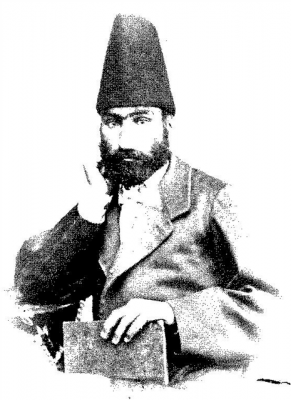
Mirza Mohammad Ali, better known as Hajj Sayyah (meaning the traveler), was born in 1836 in the town of Mahallat in Iran. His studies exposed him at a young age to modern and democratic ideas that were at the time spreading throughout parts of the world. The stark difference he observed between the treatment suffered by most Iranians under their autocratic rulers and the ideas he studied inspired him to see the rest of the world.
At the age of 23, Hajj Sayyah embarked on a remarkable journey around the globe that would last for nearly 18 years. He began his travels by wandering throughout Central Asia and Europe for more than six years. Often he traveled alone and in poverty.
The motivation for Hajj Sayyah’s travels was his thirst for knowledge and spiritual strength. He wanted to learn as much as he could about the world and how other people lived, in order to bring those ideas back to Iran. As a result of his observations throughout his travels, he concluded that human beings are supposed to live in reasonably humane societies and enjoy basic human rights.
Hajj Sayyah came to the United States through New York. During his ten year stay in the U.S., he met with many prominent personalities such as President Ulysses Grant on more than one occasion. His travels across the United States eventually took him to San Francisco where he spent several months.
Upon returning to Iran in July 1877, Hajj Sayyah became politically active and was imprisoned for having instigated a clandestine letter writing campaign to the monarch and clergy regarding the unbearable living conditions in Iran. After his release, fearing further persecution he sought the protection of the United States Legation in Tehran. This move puzzled many Iranians who didn’t know why he felt the United States government would protect him.
Hajj Sayyah went on to play a major role in the Constitutional Revolution of 1906 in Iran, and remained active until his death in 1925 at the age of 89.
In the course of studying Hajj Sayyah’s life, Dr. Ali Ferdowsi recently discovered through State Department documents that Hajj Sayyah had become an American citizen on May 26, 1875, making him the first Iranian to become a U.S. citizen. This was a closely held secret that Hajj Sayyah had shared with only a few people. Well over a century later, considering ourselves as first or second generation Iranian Americans, we are reminded by Hajj Sayyah’s story that the history of Iranian Americans is indeed much longer.
This article was made possible by the research efforts of Dr. Ali Ferdowsi, the Chair of the Department of History and Political Science at Notre Dame de Namur University, to whom we are grateful. For more details about Hajj Sayyah’s life and travels, refer to the entry by Dr. Ali Ferdowsi for Hajj Sayyah, Mirza Mohammad Ali Mahallati, in the Encyclopedia Iranica. (www.Iranica.com)
Source:
http://paaia.org/cs/our_community/the_first_iranian_american






